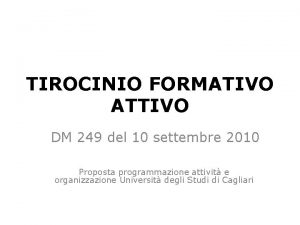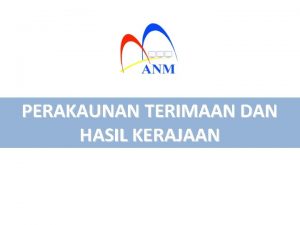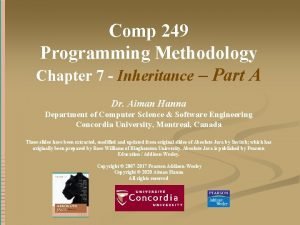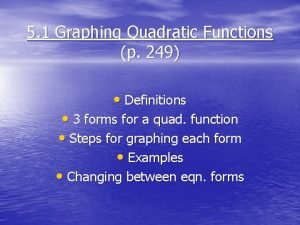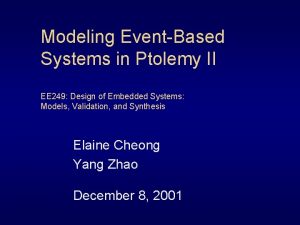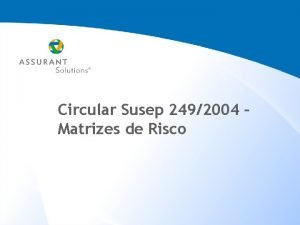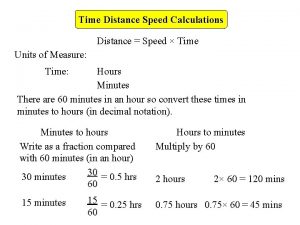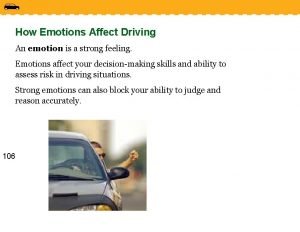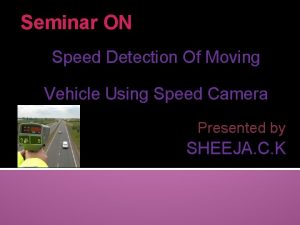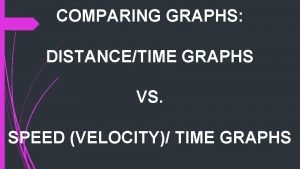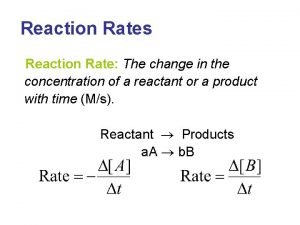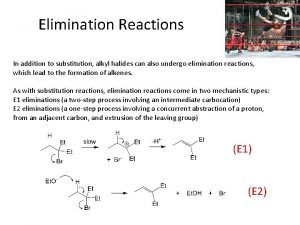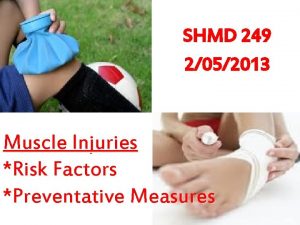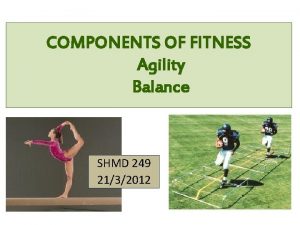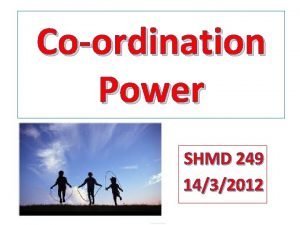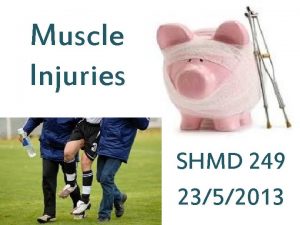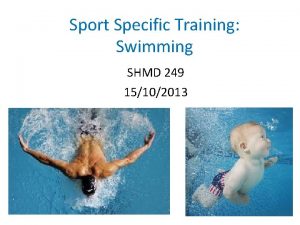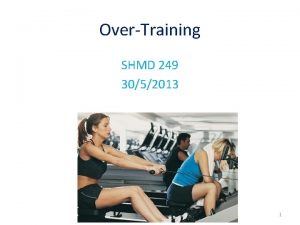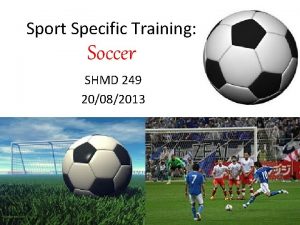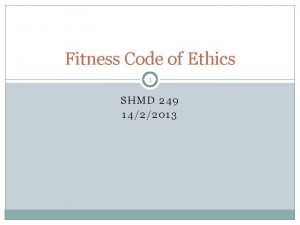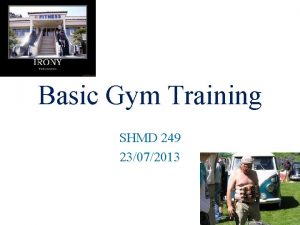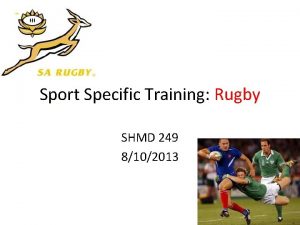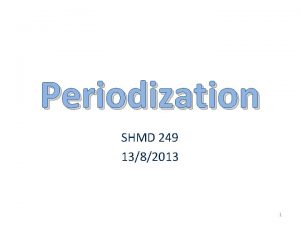Reaction Time Speed SHMD 249 11042013 Reaction Time













- Slides: 13

Reaction Time Speed SHMD 249 11/04/2013

Reaction Time: The time elapsed between stimulation and the beginning of the reaction to that stimulation. Reaction Time Ruler Test • Purpose: to measure reaction time, hand-eye quickness and attentiveness. • Equipment required: 1 meter long/regular ruler, calculator.

Ruler Reaction Time Drop • Procedure: The person to be tested stands or sits near the edge of a table, resting their elbow on the table so that their wrist extends over the side. • The assessor holds the ruler vertically in the air between the subject's thumb and index finger, but not touching. • Align the zero mark with the subjects fingers. • The subject should indicate when they are ready. • Without warning, release the ruler and let it drop - the subject must catch it as quickly as possible as soon as they see it fall. • Record in meters the distance the ruler fell. • Repeat several times (e. g. 10 times) and take the average score.

• Target population: sports requiring good handeye coordination and quick reactions, such as race car driving, boxing and racket sports. • Comments: results for left and right hands can be expected to be different, therefore this should be controlled for or at least the hand used recorded with the results.

distance (cm) time (seconds) distance time 1 0. 045 26 0. 230 51 0. 323 76 0. 394 2 0. 064 27 0. 235 52 0. 326 77 0. 396 3 0. 078 28 0. 239 53 0. 329 78 0. 399 4 0. 090 29 0. 243 54 0. 332 79 0. 402 5 0. 101 30 0. 247 55 0. 335 80 0. 404 6 0. 111 31 0. 252 56 0. 338 81 0. 407 7 0. 120 32 0. 256 57 0. 341 82 0. 409 8 0. 128 33 0. 260 58 0. 344 83 0. 412 9 0. 136 34 0. 263 59 0. 347 84 0. 414 10 0. 143 35 0. 267 60 0. 350 85 0. 416 11 0. 150 36 0. 271 61 0. 353 86 0. 419 12 0. 156 37 0. 275 62 0. 356 87 0. 421 13 0. 163 38 0. 278 63 0. 359 88 0. 424 14 0. 169 39 0. 282 64 0. 361 89 0. 426 15 0. 175 40 0. 286 65 0. 364 90 0. 429 16 0. 181 41 0. 289 66 0. 367 91 0. 431 17 0. 186 42 0. 293 67 0. 370 92 0. 433 18 0. 192 43 0. 296 68 0. 373 93 0. 436 19 0. 197 44 0. 300 69 0. 375 94 0. 438 20 0. 202 45 0. 303 70 0. 378 95 0. 440 21 0. 207 46 0. 306 71 0. 381 96 0. 443 22 0. 212 47 0. 310 72 0. 383 97 0. 445 23 0. 217 48 0. 313 73 0. 386 98 0. 447 24 0. 221 49 0. 316 74 0. 389 99 0. 449 25 0. 226 50 0. 319 75 0. 391 100 0. 452

Reaction Light Board Test • Purpose: to measure reaction time, hand-eye quickness and coordination. • Equipment required: Bosu™ ball, instrumented light board • Scoring: The score is the number of lights that are pressed during the test, out of a total possible of 90.

• Procedure: The light board is constructed so that when active, the board displays a target light that moves to different cells across the board. • The lights are located a different distances on lines radiating out from the center of the board. • The athlete stands upon a Bosu ball and facing the light board. • The light board is positioned so that the center is directly in front of the face. • The athlete tries to press as many active lights as possible.

Speed: The ability to perform a movement in a short period of time. Or, the rate at which the body or individual limbs can move.

40 Meter Sprint • Purpose: The aim of this test is to determine acceleration and speed. • Equipment required: measuring tape or marked track, stopwatch or timing gates, cone markers, flat and clear surface of at least 60 meters.

• Procedure: The test involves running a single maximum sprint over 40 meters, with the time recorded. • A thorough warm up should be given, including some practice starts and accelerations. • Start from a stationary position, with one foot in front of the other. • The front foot must be on the starting line. • The person timing should stand at the finish line with one arm held high, and call ‘ready’ followed by a sweep down their arm quickly to start the subject (do not call out ‘go’ due to the time delay in the subject hearing the call). • As the arm sweeps down, the tester should start the stopwatch which is held in the downward sweeping arm, and finish the stopwatch as their chest passes through the finish line.

• Results: Three trials are allowed, and the best time is recorded to the nearest two decimal places. • Reliability: weather conditions and running surface can affect the results, and these conditions should be recorded with the results. If possible, set up the track with a crosswind to minimize the effect of wind, and if running on grass wait until the surface is dry.

10 x 5 m Shuttle Test • Purpose: this is a test of speed and agility. • Equipment required: stopwatch, measuring tape, marker cones, a flat non-slip surface. • Scoring: Record the total time taken to complete the 50 m course.

• Procedure: marker cones and/or lines are placed five meters apart. • Start with a foot at one marker. • When instructed by the timer, the subject runs to the opposite marker, turns and returns to the starting line. • This is repeated five times without stopping (covering 50 meters total). • At each marker both feet must fully cross the line.
 Dm 249 del 2010
Dm 249 del 2010 Artigo 249 cc
Artigo 249 cc Pengeluaran resit rasmi ap70
Pengeluaran resit rasmi ap70 Comp 249
Comp 249 Y=a(x-p)(x-q) how to find a
Y=a(x-p)(x-q) how to find a Ee 249
Ee 249 Ee 249
Ee 249 Circular susep 249
Circular susep 249 How to calculate speed with time and distance
How to calculate speed with time and distance How emotions affect driving
How emotions affect driving Speed detection of moving vehicle using speed cameras ppt
Speed detection of moving vehicle using speed cameras ppt Speed and velocity
Speed and velocity Reaction rate equation
Reaction rate equation Ictahedron
Ictahedron
